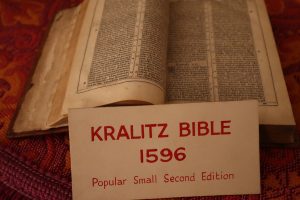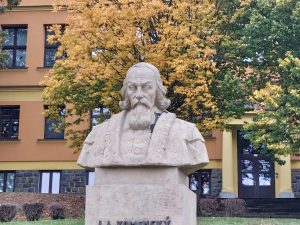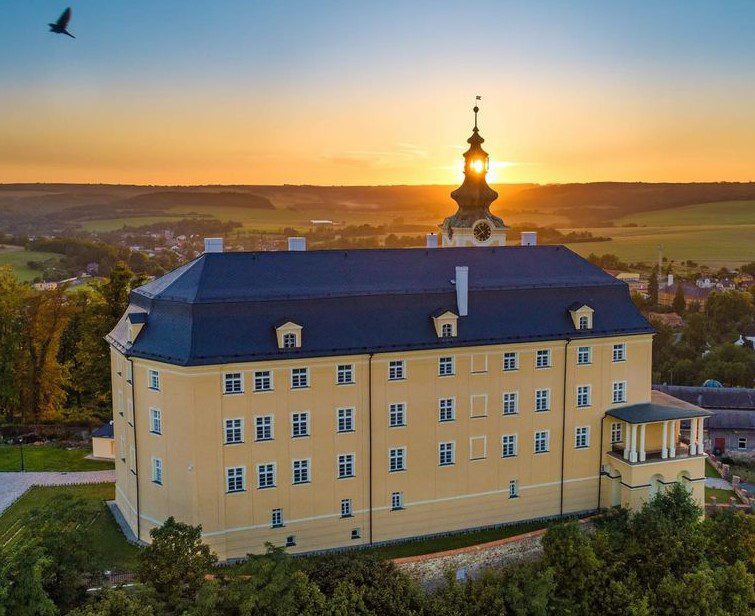Anna’s young life was a real mix of the light and the dark. The dark was linked directly to what happened in Prague in the 1400s, discussed in my previous post at https://elizabethwe.co.uk/annas-story/
The light in her life: Anna was born in 1715 in one of the many small villages of the Fulnek estate in Moravia. Today the town of Fulnek is close to the Polish border in the south-east of Czechia; the photograph above is of Fulnek castle in the sunset.
Anna was surrounded by a happy, devout family, her mother, born Anna Schneider, her father David and her older brother Melchoir. The area was rural and she spent time in the fields tending her family’s sheep. Can you picture it? Green fields, warm sunshine, peace and plenty of nature. It sounds idyllic doesn’t it? Except …
The dark in her life: Moravia, like so much of central Europe was ruled by the Holy Roman Empire and Catholicism was the official religion. All other religions were banned.
Her family had a long history of holding protestant beliefs and this was increasingly dangerous. Anna’s great grandfather, Martin Schneider, held secret meetings sometimes in a local forest to teach the non-Catholic doctrine. This nearly got him burned at the stake. Her grandfather Samuel Schneider continued to hold such meetings and so the whole family were known as TROUBLE, clearly on the radar of the local Catholic Church. It also illustrates that Anna’s mother, Anna, had grown up needing to be strong and resilient to face the terrors of persecution that stalked her family. As Anna grew up she certainly learned how to be like her mother.
When she was young Anna’s father, David Nitschmann, was imprisoned for practicing his beliefs and for having illegal books[1]. At the age of nine, Anna was awakened one night to the sound of his voice – imagine her confusion and her joy. Her father had escaped from prison.

Kralitz Bible on brief loan to Fulneck, near Pudsey
Joy was brief. Sadly, it marked the start of the family leaving their home in search a place where there was religious tolerance. First her father and then the whole family were on the move from the Fulnek area. Becoming a refugee must always be a hard decision, stalked by fear, indecision and loneliness. All this we will consider in the next episode of this story. Before then, a short diversion.
A diversion into education
Before we leave the Fulnek area with Anna and so many others, we need to look around at what else was important in Moravia. Education was and still is highly valued and it all started with one man, Jan Comenius[2].
Comenius (1592-1670) was the headmaster of the Fulnek school and the preacher. He was a bishop in the Unity of Brethren, helping to keep alive the faith that we can trace back to Jan Hus and Br Gregory. During the 30 years war he had to go into exile, working in many European countries, and to this day his impact on education worldwide is celebrated in Czechia. Ever read a picture book with a young child? If so, you can thank Comenius. Teaching by using pictures was his idea, along with encouraging curiosity and getting children involved and active in how they learn.

Comenius statue, outside a school in Suchdol.
Today there is a Comenius museum in Fulnek, a statue of him outside a school in Suchdol[3] which states his view that ‘to be a person one must be educated’[4]. There is also a large national museum celebrating his work in Prague demonstrating that Czechians truly see him as the grandfather of modern education. Comenius wrote many important texts, including ‘The Labyrinth of the World and the Paradise of the Heart’ but that is another story.
Next time we will follow Anna as her family leave Kunewald (today called Kunin) and we will also return to Comenius and the impact of his views on both religion and education.
[1] Possibly including a Kralitz Bible, the first complete translation of the Bible into the Czech language.
[2] Comenius is the Anglicised version of his name. In Czech he was Jan Komensky.
[3] About 10 kilometres from Fulnek.
[4] Please excuse the translation. I used Google Translate which is not always accurate but can be very useful.


Recent Comments